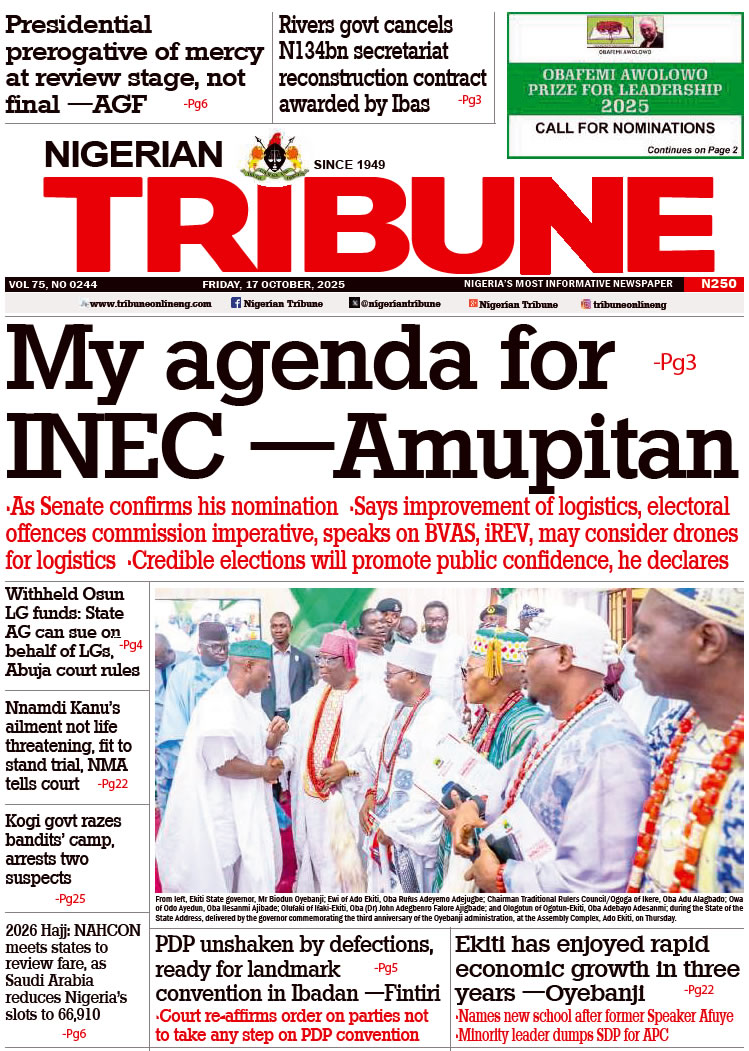SOMETIME ago, I asked the question, “What are we Yoruba nation in Nigeria doing wrong?” To date, I have given three answers to that question – that we have been carelessly lettingour great culture gradually erode away; that though we clearly chose and established the foundations for a line of successful development in the 1950s, we have abandoned it and followed Nigeria’s chaotic and corrupt ways – and thereby let the masses of our people descend into very shameful poverty; that we have allowed our farming to perish gradually – so that we are no longer able to feed ourselves today, have totally lost grip on food security, and have lost almost all of our produce (cocoa) exports which used to make us a rich people in the 1950s and 1960s.
My further answer today is that we are foolishly neglecting to use our greatest asset – our culture – to generate wealth for us. In the world today, Cultural Tourism is one of the big means by which nations generate wealth for themselves and their citizens. When people from other parts of the world come to see the attractive or exotic parts of a nation’s culture, they bring wealth into that nation. They come with foreign exchange, and with it they pay for hotel rooms, food, drinks, transportation, souvenirs, sight-seeing, and many other needs. In short, they bless the country with a lot of foreign exchange – and thereby make the country and its people richer. In particular, they make business owners and service providers richer – hoteliers, restaurant owners, bar owners, artists, artisans, public transporters, car rental owners, tour guides, messengers, and countless others. It works as if the nation is exporting aspects of its culture for sale abroad. Many countries in today’s world derive a lot of wealth from Cultural Tourism. More and more are struggling to put their culture on the pedestal for the world to come and see and buy. Even the richest countries in the world today pay a lot of attention to attracting tourists, and invest heavily in it.
Every nation has something about itself to show to the rest of the world. But, while some nations pay attention to it, others don’t. Countries like the United States, Britain, France, Russia, count their incomes from tourism every year in the billions of dollars. So do some of the countries of the Middle East and Asia – especially Saudi Arabia, Egypt, Israel and India. The ancient Egyptian monuments attract millions of visitors to Egypt every year. The monuments of early Christianity attract millions of tourists to Israel and Palestine every year. Religious tourism (the Islamic pilgrimage) takes millions to Saudi Arabia every year. In Asia, Buddhist temples and scenes and other historic sites attract millions of tourists to India and other Asian countries annually.
In all these countries, it is not just the historic monuments and cultural events and festivals that attract tourists; the governments and the people also must put a lot of effort into it. The government must provide decent and well run airports, roads, public facilities (electricity, water, etc), and the business owners and service providers must make their hotels, motels, restaurants, food, service personnel, etc, super attractive. In short, both the governments and the people must invest in this.
Unhappily, not many Black African countries have woken up to the possibilities of tourism. Under British rule, Kenya began to attract the world to come and see its wealth of animals in the wild, and Kenya has since developed into perhaps tropical Africa’s richest tourist country. Besides Kenya, only a few like Senegal, South Africa havedeveloped sizeable tourist industries.
Nigeria has enormous possibilities for Cultural Tourism. Virtually every national culture in all parts of Nigeria has something significant to show the world – and together, Nigeria could easily become owner of a Cultural Tourism industry yielding billions of dollars per annum. But, unfortunately, not only is the right level of effort not there, Nigeria’s general image as a country of political instability, of rigged and violent elections,of conflicts and monstrous corruption, and of revolts and Islamic terrorism, makes the development of any serious tourist industry very difficult. One American writer wrote about Nigeria that “no tourists go there”.
There is no doubt that, among the nations of Nigeria, the Yoruba nation is the greatest loser in this matter. Even in spite of Nigeria’s awful image in the world, we Yoruba can still generate a lot of Cultural Tourism in our own homeland. That is because Yoruba Culture is the Black African culture best known, most sought after, most studied, and most imitated, in the wider world.
In the countries of North, Central and South America, and in the West Indies, millions of people feel a strong attachment to Yoruba culture. In fact, in most of these countries, more and more people are claiming to be of Yoruba descent. The Yoruba culture is the great symbol of Black African identity and Black African pride in these countries. Even white citizens of some of these countries are adopting various aspects of Yoruba culture, especially Yoruba religion. As many as 50 million Brazilians, six million Cubans, and millions of others all over the West Indies and other American countries, claim to be of Yoruba descent or are practitioners of Yoruba religion. And the same trend is increasingly happening in other regions of the world – even in unexpected places like Europe, Asia and Australia.
When the newly crowned Oni of Ife visited the United States of America some weeks ago, the huge crowds that came to welcome him everywhere included countless Brazilians, Cubans, West Indians, and other Black Americans. The United States was overwhelmed. Large numbers of white Americans soon joined the crowds. Some in the United States media began to call the Oni the King of Africa. Very many of the Brazilians, Cubans, West Indians, and Black citizens of the United States appealed to the Oni to make arrangements to bring them to visit their Yoruba place of origin in Nigeria soon. Countless white Americans wanted to come too.
What all these mean is that, if the Yoruba people in homeland Yorubaland in Nigeria were to embark seriously on promoting a Yoruba Cultural Tourism industry, it could easily grow into a mammoth source of foreign exchange and wealth for the Yoruba Southwest and for the Nigerian Federation. If we arrange it well, we could easily have millions of tourists visiting our Southwest every year.
For instance, in the 1970s, the Institute of African Studies of Obafemi Awolowo University, Ile-Ife, started a small annual festival of Yoruba culture. We called it Ori Olokun Festival. I was one of the junior academics involved in it from the beginning – and years later, I became its principal chief executive when I was appointed Director of the Institute of African Studies. Even though we as a university department did not have enough funds to popularize the Ori Olokun Festival as widely as possible in the wider world, it quickly grew beyond our wildest imaginations. Crowds of people came annually to it from the Americas, and from other distant parts of the world.
For us the Yoruba nation, the possibilities of a great Cultural Tourism industry are great. Our festivals and other cultural properties are waiting to be turned into hugely attractive Cultural Tourism assets. With or without the problems posed by our being part of a Nigeria with its awful image in the world, we can make a big success of Cultural Tourism in our Southwest. If our states developed a general picture of what we want to show the world and how we want to show it, and if each of our states puts effort into it, we could have a prosperous Cultural Tourism Industry in our Southwest in only a few years.
Our failure to exploit this great source of wealth is one of our greatest failings as a nation in modern times. Culturally, we have been walking on gold and doing nothing with it. Even today, as these words are being written, we are still not thinking seriously of doing anything with it. It is an incredible loss of value. Let us begin to do something about it now.
WATCH TOP VIDEOS FROM NIGERIAN TRIBUNE TV
- Relationship Hangout: Public vs Private Proposals – Which Truly Wins in Love?
- “No” Is a Complete Sentence: Why You Should Stop Feeling Guilty
- Relationship Hangout: Friendship Talk 2025 – How to Be a Good Friend & Big Questions on Friendship
- Police Overpower Armed Robbers in Ibadan After Fierce Struggle






